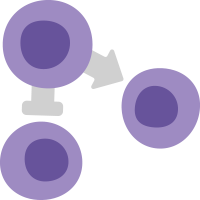
Immune Regulation News
Immune Regulation News is an online resource covering research into the regulation, suppression, and modulation of the immune system.
NF-κB Factors Cooperate with Su(Hw)/E4F1 to Balance Drosophila/Human Immune Responses via Modulating Dynamic Expression of miR-210
[Nucleic Acids Research] Scientists confirmed that the conserved miRNA miR-210 negatively regulated innate immune responses of Drosophila and human via targeting Toll and TLR6, respectively.
A Novel Macrophage Subpopulation Conveys Increased Genetic Risk of Coronary Artery Disease
[Circulation Research] Researchers utilized single-cell RNA-seq and single-cell multiomics approaches in primary human monocyte–derived macrophages to explore the transcriptional regulatory network involved in a critical pathogenic event of coronary atherosclerosis—the formation of lipid-laden foam cells.
HMGB1: A New Target for Ischemic Stroke and Hemorrhagic Transformation
[Translational Stroke Research] The authors summarize the structure and redox properties, secretion and pathways, regulation of immune cell activity, the role of pathophysiological mechanisms in stroke, and hemorrhage transformation for high-mobility group box 1 (HMGB1), which will pave the way for developing new neuroprotective drugs, reduction of post-stroke neuroinflammation, and expansion of thrombolysis time window.
Bispecific Antibody Takes a BiTE Out of B Cells in Rheumatoid Arthritis
[Nature] Amgen’s B-cell-depleting therapy blinatumomab (Blincyto) showed signs of efficacy in rheumatoid arthritis, found an academic-sponsored pilot trial of the CD19xCD3 bispecific T-cell engager (BiTE) in six patients with the autoimmune disease.
Valrubicin-Loaded Immunoliposomes for Specific Vesicle-Mediated Cell Death in the Treatment of Hematological Cancers
[Cell Death & Disease] Following the transplantation of human pediatric B-cell acute lymphoblastic leukemia, T-cell acute lymphoblastic leukemia, or acute myeloid leukemia in immunodeficient NSG mice, investigators generated patient-derived xenograft models, which were treated with valrubicin-loaded immunoliposomes loaded with antibodies to target CD19, CD7 or CD33.
HDAC Inhibition Increases CXCL12 Secretion to Recruit Natural Killer Cells in Peripheral T Cell Lymphoma
[Cancer Research] Researchers found that high expression of histone deacetylase (HDAC)3 was associated with poor prognosis in peripheral T cell lymphoma. HDAC3 inhibition suppressed lymphoma growth in immunocompetent mice but not in immunodeficient mice.
LGR6 Frameshift Variant Abrogates Receptor Expression on Select Leukocyte Subsets and Associates With Viral Infections
[Blood] In neutrophils, monocytes, and natural killer cells from volunteers homozygous for this variant, investigators found a significant downregulation in the expression of leucine-rich repeat-containing G-protein-coupled receptor 6 (LGR6) when compared with controls without the variant.
Fate Therapeutics Announces First Lupus Patient Treated in Phase 1 Autoimmunity Study of Off-the-shelf FT819 CAR T-cell Program
[Fate Therapeutics, Inc.] Fate Therapeutics, Inc. announced that the first patient with systemic lupus erythematosus has been treated in the Phase I autoimmunity study of FT819, the company’s off-the-shelf, CD19-targeted chimeric antigen receptor T cell program.
THEMIS Promotes T Cell Development and Maintenance by Rising the Signaling Threshold of the Inhibitory Receptor BTLA
[Proceedings Of The National Academy Of Sciences Of The United States Of America] Investigators showed that the T cell lineage protein THEMIS operates as a rheostat which restrain the signaling capacity the inhibitory receptor B- and T-lymphocyte attenuator (BTLA).
Triune Nanomodulator Enables Exhausted Cytotoxic T Lymphocyte Rejuvenation for Cancer Epigenetic Immunotherapy
[ACS Nano] Scientists presented a well-designed triune nanomodulator, termed ROCA, which demonstrated robust capabilities in tumor epigenetic modulation and immune microenvironment reprogramming for cancer epigenetic immunotherapy.
The Immunoglobulin Superfamily Ligand B7H6 Subjects T Cell Responses to NK Cell Surveillance
[Science Immunology] By screening for mediators of natural killer (NK) cell recognition on T cells, researchers identified the immunoglobulin superfamily ligand B7H6 to be highly expressed by activated T cells, including patient-infused CD19-targeting chimeric antigen receptor (CAR) T cells.
The Immunoglobulin Superfamily Ligand B7H6 Subjects T Cell Responses to NK Cell Surveillance
[Science Immunology] By screening for mediators of natural killer (NK) cell recognition on T cells, investigators identified the immunoglobulin superfamily ligand B7H6 to be highly expressed by activated T cells, including patient-infused CD19-targeting chimeric antigen receptor (CAR) T cells.
For over a decade, Immune Regulation News has been keeping the scientific community up-to-date with the latest research and reviews related to immune regulation. Key research areas covered include the roles of regulatory T cells (Treg cells) in autoimmunity and self-reactivity, as well as immune response to disease, transplantation and cancer. We also provide vital updates on the latest jobs and upcoming events in the field of immunology.

 Cancer Stem Cell News
Cancer Stem Cell News Cell Therapy News
Cell Therapy News Dermal Cell News
Dermal Cell News Endothelial Cell News
Endothelial Cell News ESC & iPSC News
ESC & iPSC News Extracellular Matrix News
Extracellular Matrix News Hematopoiesis News
Hematopoiesis News Hepatic Cell News
Hepatic Cell News Human Immunology News
Human Immunology News Immune Regulation News
Immune Regulation News
 Intestinal Cell News
Intestinal Cell News Mammary Cell News
Mammary Cell News Mesenchymal Cell News
Mesenchymal Cell News Muscle Cell News
Muscle Cell News Neural Cell News
Neural Cell News Organoid News
Organoid News Pancreatic Cell News
Pancreatic Cell News Prostate Cell News
Prostate Cell News Pulmonary Cell News
Pulmonary Cell News
